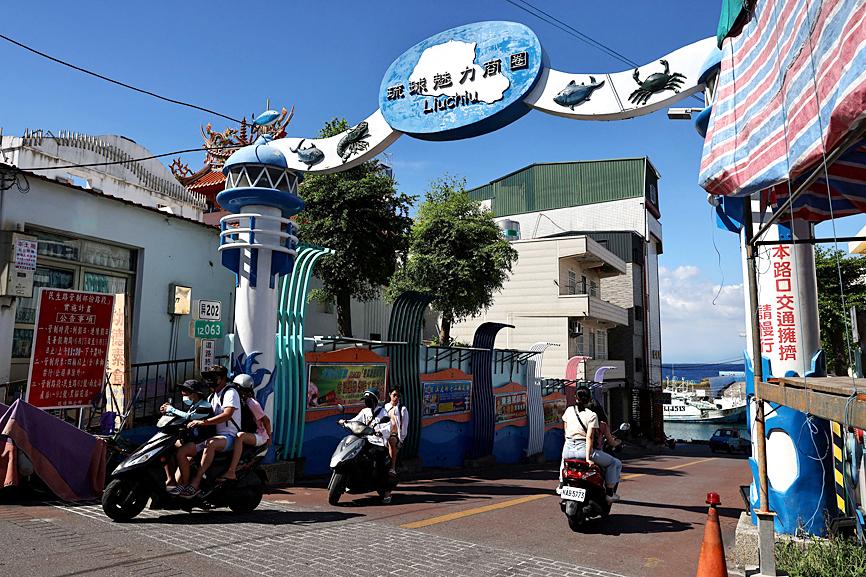Many people in Taiwan look upon China’s military exercises over the past week with calm resignation, doubting that war is imminent and if anything, feeling pride in their nation’s determination to defend itself.
After a visit to Taiwan last week by US House of Representatives Speaker Nancy Pelosi, China has sent ships and aircraft across an unofficial buffer between Taiwan and China’s coast and missiles over Taipei and into waters surrounding the nation since Thursday last week.
However, Rosa Chang, proudly watching her son take part in Taiwanese military exercises that included dozens of howitzers firing shells into the Taiwan Strait off Pingtung County, said that China’s behavior was “childish.”

Photo: Ann Wang, Reuters
“It’s like a group of children threatening you and telling you what to do... China really doesn’t have to do all this,” Chang said.
Lou Wei-chieh (樓偉傑), a military director general of political warfare, told reporters that the annual live-fire exercises aimed at beating back invaders intent on storming beaches, were routine and “unrelated to the current situation.”
Taiwan says China was using Pelosi’s trip as a pretext for intimidation it had long had in the works.
“We’re just ordinary people, there’s nothing we can do,” said a man who gave his name as Chen, also watching the Pingtung drills. “If anything happens, there’s nothing we can do.”
Many in Taiwan say they are accustomed to decades of saber rattling and see little cause for alarm.
An opinion poll published this week by Taiwan’s Chinese Association of Public Opinion Research showed that 60 percent of respondents were either not that worried or not worried at all that there would be a war between Taiwan and China.
“We’re not feeling particularly nervous,” said Jenny Cheng, a 23-year-old civil servant. “Nothing special is going to happen.”
Others have rallied round to support the government’s defiance.
Robert Tsao (曹興誠), founder and former chairman of Taiwanese chip maker United Microelectronics Corp, last week pledged to donate NT$3 billion (US$100 million) to help Taiwan bolster its defenses.
China this week said that it would conduct more drills focusing on anti-submarine and sea assault operations — confirming the fears of some security analysts and diplomats that it would keep up the pressure on Taiwan’s defenses.
However, on Siaoliouciou Island (小琉球), a picturesque tourist spot near one of the areas where the Chinese military was conducting exercises last week, people were largely indifferent.
“It feels very normal,” said Chung Ping, 30, who owns a diving hostel.
He said that no one had canceled their holiday bookings.
“It’s unlikely that conflict will happen,” he said.

A group of Taiwanese-American and Tibetan-American students at Harvard University on Saturday disrupted Chinese Ambassador to the US Xie Feng’s (謝鋒) speech at the school, accusing him of being responsible for numerous human rights violations. Four students — two Taiwanese Americans and two from Tibet — held up banners inside a conference hall where Xie was delivering a speech at the opening ceremony of the Harvard Kennedy School China Conference 2024. In a video clip provided by the Coalition of Students Resisting the CCP (Chinese Communist Party), Taiwanese-American Cosette Wu (吳亭樺) and Tibetan-American Tsering Yangchen are seen holding banners that together read:

UNAWARE: Many people sit for long hours every day and eat unhealthy foods, putting them at greater risk of developing one of the ‘three highs,’ an expert said More than 30 percent of adults aged 40 or older who underwent a government-funded health exam were unaware they had at least one of the “three highs” — high blood pressure, high blood lipids or high blood sugar, the Health Promotion Administration (HPA) said yesterday. Among adults aged 40 or older who said they did not have any of the “three highs” before taking the health exam, more than 30 percent were found to have at least one of them, Adult Preventive Health Examination Service data from 2022 showed. People with long-term medical conditions such as hypertension or diabetes usually do not

Heat advisories were in effect for nine administrative regions yesterday afternoon as warm southwesterly winds pushed temperatures above 38°C in parts of southern Taiwan, the Central Weather Administration (CWA) said. As of 3:30pm yesterday, Tainan’s Yujing District (玉井) had recorded the day’s highest temperature of 39.7°C, though the measurement will not be included in Taiwan’s official heat records since Yujing is an automatic rather than manually operated weather station, the CWA said. Highs recorded in other areas were 38.7°C in Kaohsiung’s Neimen District (內門), 38.2°C in Chiayi City and 38.1°C in Pingtung’s Sandimen Township (三地門), CWA data showed. The spell of scorching

POLICE INVESTIGATING: A man said he quit his job as a nurse at Taipei Tzu Chi Hospital as he had been ‘disgusted’ by the behavior of his colleagues A man yesterday morning wrote online that he had witnessed nurses taking photographs and touching anesthetized patients inappropriately in Taipei Tzu Chi Hospital’s operating theaters. The man surnamed Huang (黃) wrote on the Professional Technology Temple bulletin board that during his six-month stint as a nurse at the hospital, he had seen nurses taking pictures of patients, including of their private parts, after they were anesthetized. Some nurses had also touched patients inappropriately and children were among those photographed, he said. Huang said this “disgusted” him “so much” that “he felt the need to reveal these unethical acts in the operating theater